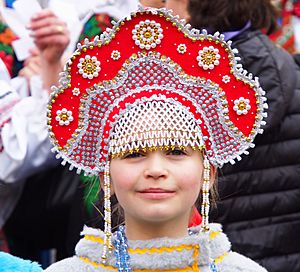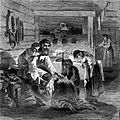Maslenitsa facts for kids
Maslenitsa is a very popular and joyful holiday in Russia. It started long ago, even before Russia became Christian, when people followed older beliefs (called pagan traditions). Back then, it celebrated the start of spring, when the Sun is at its highest point (the spring solstice). Today, it's seen as a Christian holiday that happens right before a special fasting period called Great Lent.
During Maslenitsa, people enjoy lots of delicious food, but they usually avoid eating meat. The holiday lasts for seven days. On the very last day, people burn a large doll made of branches and straw, dressed in bright clothes. This doll is also called "Maslenitsa." It represents the cold, harsh winter. By burning the "Maslenitsa" doll, people say goodbye to winter and welcome the warm, new spring!
Contents
How Maslenitsa is Celebrated
Each day of Maslenitsa has its own special meaning and activities.
Monday: Welcoming the Holiday
On Monday, people start the holiday with fun games. They go sledding, have snowball fights, and ride on swings. Russian people believe that the happiness and joy they feel on this day will stay with them all year long.
Tuesday: Games and Pancakes
Tuesday is a day for more games and for baking "blini." Blini are thin, round pancakes, and they are the most popular food during Maslenitsa. These round pancakes look like the Sun, symbolizing warmth and light.
Wednesday: Visiting Friends and Family
On Wednesday, people often visit their friends and relatives. They share blini and other treats with each other. It's a day for enjoying good company and delicious food.
Thursday: Chasing Winter Away
On Thursday, people have a tradition of riding horses around their villages or neighborhoods. They do this to try and "drive away" the winter. It's a lively and exciting way to encourage spring to arrive.
Friday: Mothers-in-Law Evenings
Friday is often called "Mothers'-in-law evenings." This is because sons-in-law visit their mothers-in-law. It's a time for family gatherings and shared meals.
Saturday: Visiting Relatives
On Saturday, everyone goes to visit their relatives. People eat and drink as much as they like and play different games. It's a very merry day filled with celebration.
Sunday: Forgiveness and Farewell
Sunday is the last day of Maslenitsa. It's also known as the Sunday of Forgiveness. On this day, everyone asks their relatives and friends for forgiveness for any mistakes or hurtful things they might have done. The usual reply is, "God will forgive." After this, people sing songs, dance, and at the end of the day, they burn the Maslenitsa doll.
Maslenitsa and Weddings
Maslenitsa is also seen as a family holiday because spring represents new life and new beginnings. People believe that couples who get married during Maslenitsa will have a very strong and happy marriage. They are also thought to have many children. Sometimes, as a fun tradition, people might playfully throw those who aren't married yet into the snow!
Images for kids
-
Vasily Surikov. Taking a Snow Town, 1891.
-
Maslenitsa celebrations in Kharkiv, 2014.
-
Maslenitsa festivities in St. Petersburg, 2018.
See also
 In Spanish: Maslenitsa para niños
In Spanish: Maslenitsa para niños
 | Emma Amos |
 | Edward Mitchell Bannister |
 | Larry D. Alexander |
 | Ernie Barnes |









